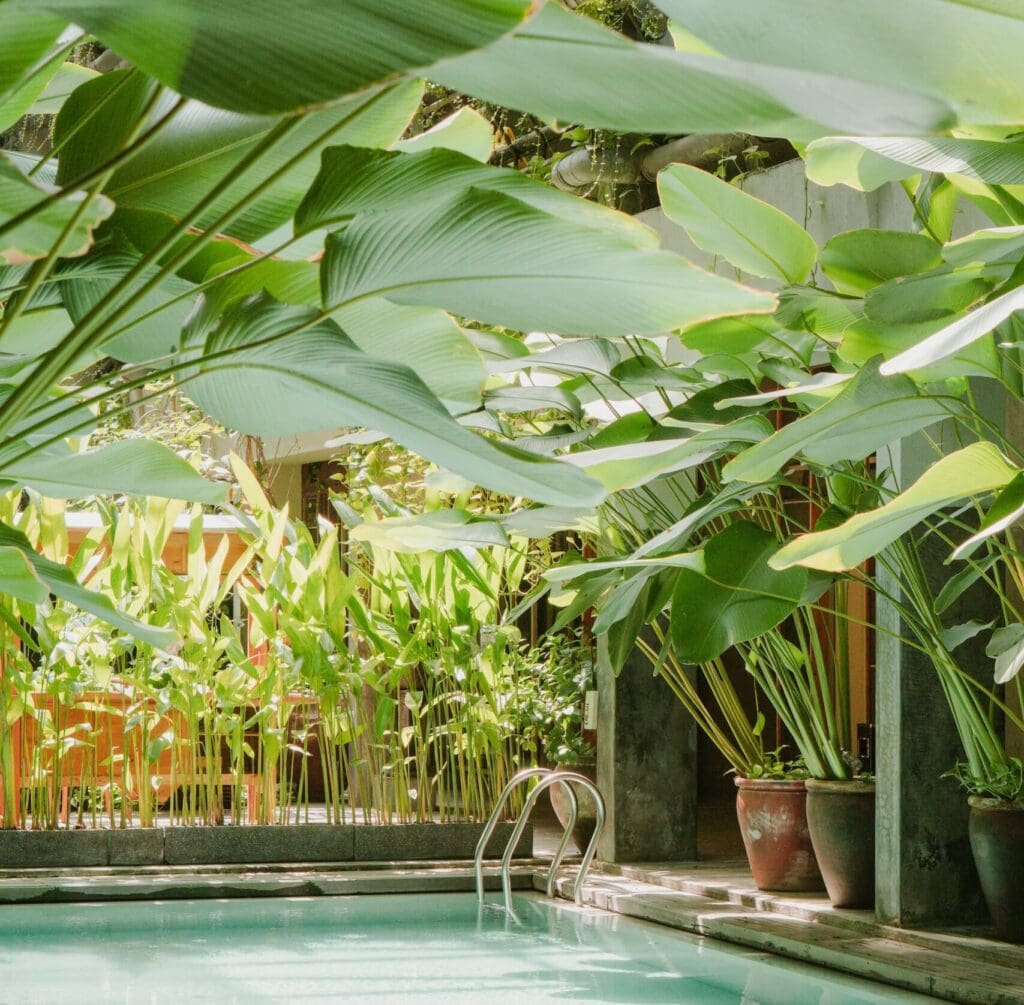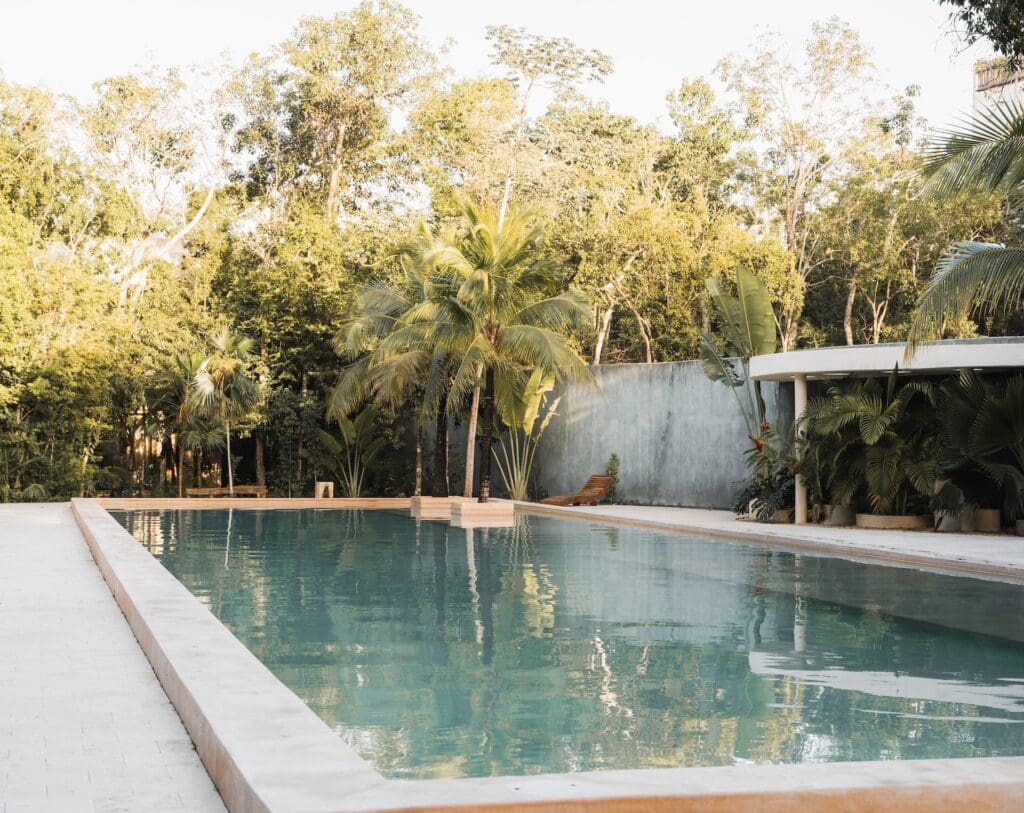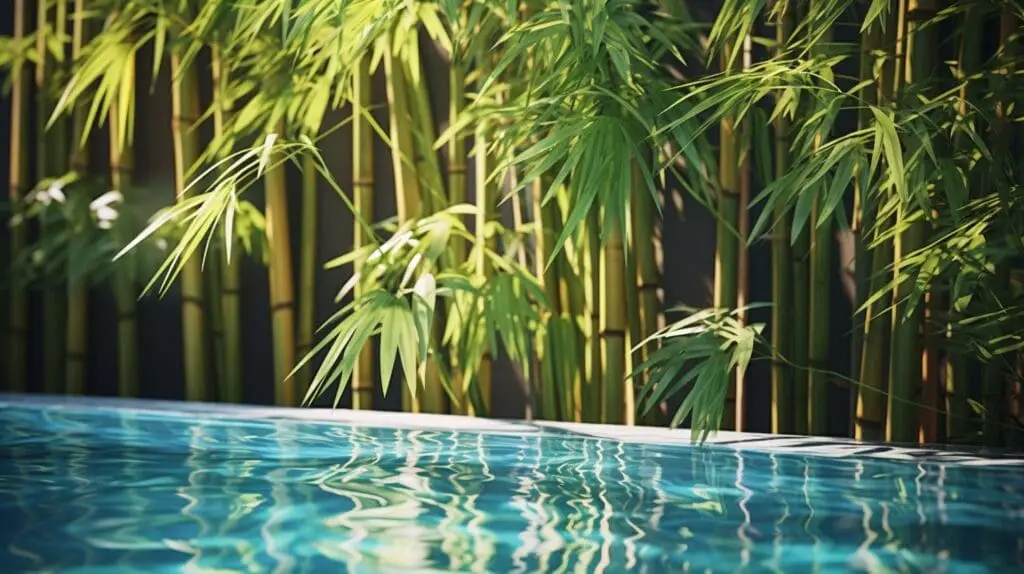Planting Bamboo Around Pools: What to Consider
Are you thinking about planting bamboo around your pool? If so, there are some important factors to consider.
Bamboo can be a great addition to your poolside landscape, but it’s essential to know if it has the characteristics that are pool-friendly.
Key Takeaways
- Planting bamboo near pools can provide natural shade, privacy, and create a tropical atmosphere.
- It is important to choose the right type of bamboo, such as clumping and non-invasive varieties, with smaller leaves to prevent debris in the pool.
- Considerations like proper spacing, avoiding root damage, and checking local regulations are necessary when planting bamboo near pools.
- Regular maintenance, including removing debris, trimming, watering, and monitoring for pests and diseases, is essential for healthy bamboo growth near pools.
Characteristics of pool friendly plants
When choosing plants for around your pool, it’s important to consider their characteristics and how they will interact and cope with the pool environment. Plants that are resilient to a pool environment usually have the following characteristics:
1. Drought-tolerant: Pool areas can often have limited watering or access to water, so it’s important to choose plants that can withstand dry conditions.
2. Non-invasive root systems: Opt for plants that have non-invasive root systems, as aggressive roots can damage pool structures and plumbing.
3. Low litter: Avoid plants that drop excessive leaves, flowers, or debris, as they can create additional maintenance and cleaning work for pool owners.
4. Non-slippery: Choose plants that don’t have slippery or waxy leaves, as these can create hazards around the pool area.

5. Non-allergenic: Some plants can trigger allergies or sensitivities in individuals, so it’s best to select plants that are non-allergenic to ensure a comfortable environment for pool users.
6. Evergreen or year-round interest: Consider plants that maintain their foliage throughout the year or offer visual interest even during the pool’s off-season.
7. Resistant to chlorine or saltwater exposure: If the pool uses chlorine or saltwater, look for plants that can tolerate or are resistant to these chemicals.
8. Non-aggressive growth: Avoid plants that spread rapidly or aggressively, as they can quickly overtake the pool area and require frequent pruning or maintenance.
9. Shade-providing: Choose plants that can offer shade to pool users, providing relief from the sun’s intense rays.
10. Insect-repellent: Opt for plants with natural insect-repelling properties to minimize unwanted pests around the pool area.
Benefits of Bamboo as a Poolside Plant
For a low-maintenance and visually appealing option, bamboo provides privacy and a serene atmosphere around your pool.
Bamboo is an excellent choice for planting near the pool due to its many benefits, including the following:
1. Privacy: Bamboo is known for its dense growth and tall, upright stalks, providing a natural screen that can help create a private and secluded pool area.
2. Aesthetics: Bamboo adds a touch of natural beauty and a tropical feel to any landscape. It can enhance the overall visual appeal of the pool area and create a tranquil and serene atmosphere.
3. Shade: Bamboo can provide shade and reduce the amount of direct sunlight reaching the pool area. This can help to keep the water temperature cooler and make the pool area more comfortable for swimmers.
4. Sound Barrier: The rustling of bamboo leaves can act as a natural sound barrier, reducing noise pollution from nearby roads or neighbors. This can create a more peaceful and relaxing pool environment.
5. Low Maintenance: Bamboo is relatively low maintenance compared to many other plants. It is fast-growing and can quickly fill in spaces, making it an ideal choice for creating a natural privacy barrier near the pool.
6. Drought Tolerance: Bamboo is known for its resilience and ability to withstand drought conditions. This makes it a suitable choice for poolside planting, as it can survive in areas with limited water availability.
7. Erosion Control: The extensive root system of bamboo helps to stabilize the soil and prevent erosion. Planting bamboo near the pool can help to protect the surrounding landscape from soil erosion caused by excessive water splashing or rain runoff.
8. Versatility: Bamboo comes in various sizes, colors, and textures, offering a wide range of options to suit different pool designs and personal preferences. Whether you prefer a tall and elegant bamboo species or a shorter and bushier variety, there is likely a bamboo plant that will complement your pool area.
However, it’s important to consider the specific type of bamboo carefully as they have different qualities and characteristics. Some of them may lead to potential problems poolside.
Potential Problems with Bamboo as a Poolside Plant
To prevent potential problems with bamboo as a poolside plant, make sure to evaluate its root system and choose a species that won’t damage your pool or nearby structures.
When considering bamboo for landscape design around your patio or pool area, it is important to understand the characteristics of different bamboo varieties. Some types of bamboo have invasive root systems that can cause damage to pools and underground pipes.
To avoid this, consider planting clumping bamboo species which have non-invasive roots and grow in contained clusters. These varieties are hardy and will provide lush green foliage without causing any harm.
How to avoid typical risks and potenital problems with bamboo near pools
When planting bamboo near your pool, there are a few potential problems that you should be aware of.
First, the leaf litter from bamboo can create a mess in and around the pool area.
Second, bamboo has spreading roots that can damage pool structures and plumbing if not properly managed.
Lastly, there are other potential issues to consider such as the height of the bamboo blocking sunlight or creating shade, attracting pests like mosquitoes, and requiring regular maintenance to keep it under control.



Leaf litter
Make sure you’re aware of the potential leaf litter that bamboo can produce and how it may affect your pool maintenance.
When you plant bamboo near a pool, it’s important to consider the poetential for it to shed leaves. That is not to say bamboo is any worse than most other plants in terms of dropping leaves, but keep in mind that the leaves will eventually fall and spread around your pool area.
If you’re considering using bamboo as for poolside planting, make sure you are prepared to deal with (or put up with) the leaf litter that comes along with this hardy and fast-growing plant.
Spreading roots
The spreading roots of bamboo can cause potential damage to nearby structures if not properly managed. It is important to consider the impact that planting bamboo near your pool may have on the pool’s structure and surrounding areas.
Here are a few things to keep in mind:
-
Root containment: Bamboo has a reputation for having aggressive and spreading roots. To prevent damage, it is crucial to install root barriers and/or choose clumping varieties that are less invasive.
-
Maintenance: Regularly monitor the growth of the bamboo and trim any wandering rhizomes to prevent them from encroaching into unwanted areas.
Planting bamboo around your pool can provide many benefits, such as creating a natural privacy screen with its tall, dense foliage. However, it is essential to make an informed choice to avoid potential problems such as the impact of spreading roots on the integrity of your pool. Any running species should be avoided in favor of a clumping species. Further, even clumping species should be planted with at least a few feet from the pool edge.
Despite these challenges, many homeowners choose to plant bamboo around their pools for its privacy benefits and lush green foliage that adds a tropical feel to the surroundings. It’s important to carefully weigh these factors before making your choice.
Suggested bamboo species to plant around the pool
Consider planting a clumping bamboo species around your pool, as they tend to have a more contained growth habit and are less likely to spread aggressively. This choice will not only add beauty to your pool area but also provide numerous benefits.
Here are two suggested bamboo species that you can consider:
-
Bambusa vulgaris ‘Vittata’: With its striking yellow-striped green foliage, this hardy bamboo variety adds an exotic touch to any poolside. It creates a sense of privacy without taking up too much space in your narrow garden.
-
Fargesia nitida ‘Great Wall’: This non-invasive clumping bamboo is known for its dense foliage and upright growth habit. Its roots stay relatively shallow, making it an excellent choice for planting near pools.
Frequently Asked Questions
Q: Will bamboo roots clog the pool equipment?
A: Bamboo roots can potentially clog pool equipment if not properly managed. It is important to choose a bamboo variety with non-invasive roots and maintain regular root pruning to prevent any issues.
Q: Is bamboo a good plant to create a privacy hedge near a swimming pool?
A: Yes, bamboo can work well as a privacy hedge near a swimming pool. Its dense growth and tall height provide excellent privacy screening.
Q: How far away should I plant bamboo from my pool?
A: It is recommended to plant bamboo at least 5-10 feet away from your pool to avoid any potential damage to the pool liner or overcrowding of the area.
Q: Is bamboo hardy enough to withstand pool chemicals?
A: Bamboo is hardy enough to withstand pool chemicals, but it is advisable to keep the bamboo foliage away from direct contact with pool water and rinse it off occasionally.
Q: What other types of bamboo is best for planting near a swimming pool?
A: The ‘Gracilis’ bamboo (Slender Weavers Bamboo) is an ideal plant for those narrow garden areas around the pool. It is a clumping bamboo variety that stays in a tight, vertical formation.
Q: Do I need to worry about bamboo spreading and taking over my backyard pool?
A: Clumping bamboo varieties are non-invasive and should not spread and take over the backyard pool area. However, regular maintenance and root pruning might be necessary to keep it contained.
Q: Can bamboo and bougainvillea be planted together near a swimming pool?
A: Yes, bamboo and bougainvillea can be planted together near a swimming pool to create a visually appealing and colorful landscape. Just ensure that both plants have enough space to grow without competing with each other.

